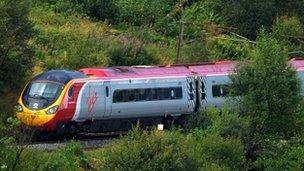TUC Congress: UK’s railways ‘a gigantic scam’
- Published

Virgin is mounting a legal challenge over its loss of the West Coast franchise
The UK's railway system "has become a gigantic scam for siphoning off public money", the TUC's annual conference has heard.
Delegates voted unanimously in favour of a renationalisation of the network.
Bernard Kennedy, of the rail workers' union Aslef, said fares were too high and the railways were "broken, derailed and disintegrated".
But the government says it is increasing investment and improving services.
Season ticket prices in England are set to go up by an average of 6.2% in January.
This is partly due to a surge in inflation in July, the month on which the increases are based.
The TUC debate on the state of the rail system on the day that Virgin boss Sir Richard Branson, who is contesting the government's decision to award the West Coast Mainline franchise to rival First Group, gave evidence to the Commons Transport Committee.
He told MPs the move would be "bad for the UK" but First Group chief executive Tim O'Toole said his company would provide a better service than Virgin and that fare increases would "broadly follow inflation" if passenger numbers grew at the expected rate.
'Greedy'
But, at the TUC conference in Brighton, Manuel Cortes, general secretary of the TSSA transport union, said the debate over ownership should be more fundamental.
He argued renationalisation would "carry the support of working people up and down the country", as they were "fed up with having to pay rip-off fares".
He added: "The reality is that, since the railways were privatised, passengers, and commuters in particular, have become cash cows for the government and greedy private operators."
Mr Cortes also said: "When you look at the very public spat between Branson and First Group over the West Coast line, you wonder what's behind it.
"It's not the service for passengers but maximising the profits that they are going to make.
"That's why Branson is determined to hold on to the line and why the First Group wants to get its hands on it."
He estimated that £1.2bn could be returned for investment in railways if the system was renationalised, cutting fares by an average of 18%.
Mr Cortes also urged the Labour Party to change its policy to one of restoring state ownership, something the party is reported to be considering as part of its current policy review.
'Efficiency'
Mr Kennedy, an Aslef delegate from Bristol, told the hall that British Rail, which ran the network before services were privatised in the mid-1990s, had not been "perfect" but "compared with today it wasn't too bad."
He added: "The railways are broke, derailed and disintegrated, The rail industry has become a gigantic scam for siphoning off public money."
The government has said the fare increases are necessary in the short-term to achieve the goal of bringing down the cost of running railways and making services less dependent on taxpayers.
The coalition also insists the improvement of services, such as electrification and better carriages, necessitates higher fare increases in the short term.
Newly-appointed Transport Secretary Patrick McLoughlin said: "A relentless focus on efficiency will help us put an end to the above-inflation increases at the earliest opportunity.
"We are only able to fund this biggest modernisation programme since the Victorian era to build a railway fit for the 21st century because we have taken tough but correct decisions elsewhere to cut spending, redirecting our resources to boost growth and to get our economy moving.
"Of course when it comes to resources we invest in our railway network, fare revenues are crucial in being able to fund the massive upgrade programme we are delivering."
- Published10 September 2012
- Published27 August 2012
- Published15 August 2012